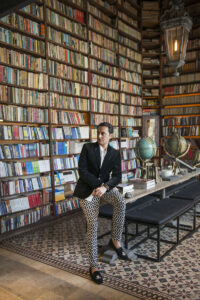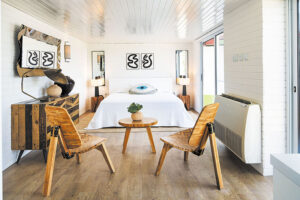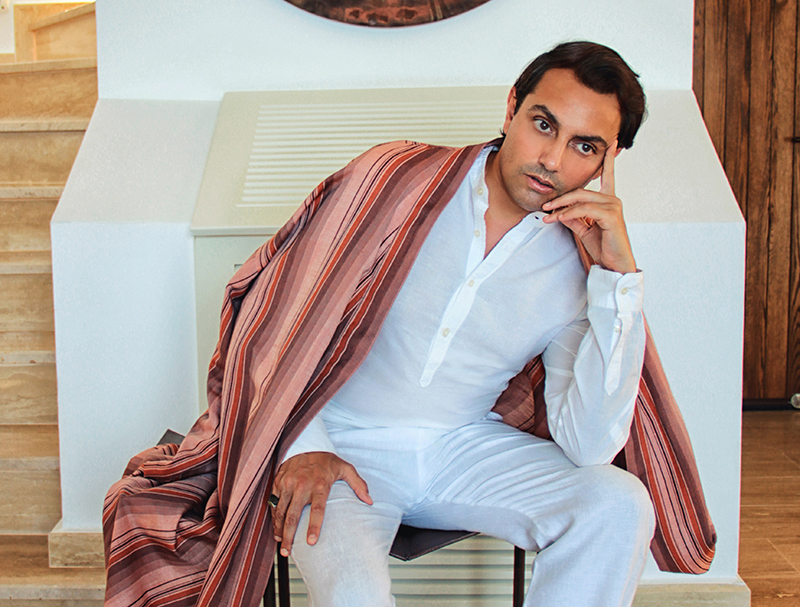A designer who won international acclaim for the renovation of a bookshop in north Nicosia now works all round the world. AGNIESZKA RAKOCZY meets him
”I never leave my clients alone,” rising star of the international interior design world Emre Osmanlar declares sitting on a long white sofa in his sun-lit sitting room facing the sea.
“Every other year I still go to the Rustem’s to tidy things up even though our contract finished a long time ago. The relationship I have with my clients is for life and it is based on friendship, not a contract,” he adds referring to Rustem’s, the old bookshop, housed in the late 19th century Ottoman mansion in north Nicosia’s old town. It was his first public project when he renovated it in 2015, and bears his hallmark signature.
“It was built originally as a town house, but then in the 1930s it was converted into commercial premises,” Emre explains. “At the time, there was Art Deco influence all over the town, so during my renovation I wanted to amplify this effect. With this in mind, I redesigned the entrance doors and other decorational elements inside in the same manner.”

“At Rustem’s we did a lot of elimination to get to the core of the space. We removed layers and layers of plaster and lots of gypsum from the ceilings. The same was true for the flooring…The work was almost archaeological because in each instance I had to decide which period of the layer I wanted to retain.”
The act of renovating the bookshop plus Emre’s committment to keeping the old space intact while injecting it with new life combined to catapult both the venue and designer to another level. In the years following the renovation, the bookshop has become a standout feature of old Nicosia, a must-visit for all self-respecting international travellers. For Emre it also helped launch his international career, taking his work far beyond the island to Turkey, Saudi Arabia, France and the UK.
But Emre Osmanlar’s life was not always supposed to take this path. For many years, just like many other Cypriots raised with a filial sense of duty to inherent expectations he thought his destiny was to take over his father’s trading business. “The plan always was that I would study business and then come back to Cyprus and work for my father,” the 42-year-old admits.
At age 17, Emre was sent to the United States, where he studied at California State University. His major was journalism but he also took a minor degree in music. “I had been learning how to play piano since I was five and music was always my saviour so I did a second degree in piano and it helped me to keep my sanity,” he laughs.
“Then I went to do a Human Resources Management MA at the Westminister Business School in London. I loved living there. I was going to all the art galleries and to the opera every week to the point where I actually tried to delay my return to Cyprus as much as possible. I was very priviliged because my father was covering my financial needs but he also kept on asking when I was coming back and I kept on saying that I have to get some experience… The truth was I wasn’t ready to take over from him but finally I had to go back so I did.”

“In the 2000s there was a big financial crisis in Turkey and because my father invested a lot in the stockmarket there he suffered a big crash. Also he and his sister owned a bank in the north and when this crisis happened the bank became endangered. My father did everything in his power to save the bank, paying out all the deposits from his own pocket to the point where he literally bankrupted himself. Later, the bank was sold to a German group and later again it was taken over by somebody else. Meanwhile, my father’s business had greately diminished and I was the one who had to face and deal with it.”
However, once he came back and took a role in the family business he soon found out he and his father had different opinions about how to tackle crises.
“My father owned some properties and among them my favourite was an old Ottoman konak (mansion) in the Arab Ahmet district of old Nicosia. It was always my dream to renovate it. But when the bankruptcy process started and my father had to start liquidating his assets he decided that the konak was to be the first to go. I asked him repeatedly to change his mind and sell something else but he refused, saying his other properties were more valuable. He was probably right but for me it was a huge eye-opener. I suddenly thought ‘all my childhood I always heard my father saying that whatever was his was mine as well but here, now I had to wake up to the reality of him taking his own decisions, while I was just left watching’.”
It took Emre just one night to decide that it was time to go. The next day he announced that he was leaving the family business and would embark on establishing his own career.
“My father was surprised and asked me what I was planning and I said ‘well, I am already designing jewellery as a hobby, and I am very interested in interiors and architecture so I will pursue my career in this’. My father’s response was to say ‘but you didn’t study any of this?’and I answered, ‘it doesn’t matter — I think I have the necessary knowledge’.”
All these years later, it’s hard to refrain from asking, did he really know what he was planning to do?
“Well, actually I did. What happened to me that day was actually a very interesting process. It was like some kind of awakening. My family was really broke at that time so I didn’t have any money. I didn’t even have enough to buy some petrol for my car. But I evaluated my entire life up until this moment and decided that the first thing I would do is sell my old pieces of jewellery, the ones I designed myself, so I would have some cash. So I organised a little garage sale in the House Cafe in Kyrenia and invited my friends and told them to invite their friends, and that generated 1,080 euros. With this money I decided to buy a plane ticket to Paris and start my life there.”
But the jewellery, his interest in which had started on gift buying trips to the local jeweller with his father, led to his next step rather like it would in a film. “A British woman who had bought a piece of my jewellery during the garage sale and who worked as an estate agent called me one day. Because she liked my style, she wanted to introduce me to a couple who had just bought three old village houses from her.”
He remembers how, serendipitously, “she thought I should become their designer.”
Adding to the believe it or not quality of the unfolding story, Emre was due to leave for Paris the very next day. Nevertheless, he agreed to meet the couple and they immediately hit it off.
“I told them straight away, look, I am neither an architect nor a designer and this took them aback a bit but we did a tour of their property and I could see that it had a lot of potential so I decided I would just share all my ideas with them. Within half an hour they gave me my first job!”
Emre still flew to Paris but on arrival there bought a return ticket with the money his new clients had advanced him, and soon he was back in Cyprus to start working.
“I hired an architect to do proper drawings becasue I could only do my drawings by hand, then a topographer to study the topography of the land, and an archaeologist to check the area and see what could be done with it. All the years of studying business suddenly made sense. I formed a team and somehow became a boss. People quickly recognised that I could see the architectural patterns and create solutions, and that even without an architectual degree I could attract clients…. That created respect. Until this day we are still working together.”
So, based on that account, would it be fair to assume that Emre’s life has been a stream of lucky coincidences?
“Well, in a way, it is. This first renovation project created some buzz and brought me my next commission, which was the Rustem project, and that led me to my next job in Istanbul, and then what I did in Istanbul brought me to my first big international tender in Riyadh. And the Riyadh job, oh well, when I went there for the first time I suddenly found myself in competition with the top 10 interior designers in the world. It was very scary. It was me and these very famous designers like theAlberto Pinto agency or Jean Louis Deniot. And after Riyadh more jobs came — in Paris, London and Geneva. Suddenly things took off.”
Not that it was that simple or that easy.
“I had to work very hard for it, very hard. I had no choice. I had to save myself and my father and my family from bankruptcy. I had to face my own reality in a very tough way. For the first two years I never said ‘no’ to a project, no matter how big it was. I worked till 3-4am every day. It was only in my third year that I started landing business opportunities and found myself being recommended to work for one of the largest families in the world, al Saud, to design their palaces and to choose their art pieces.”
Nowadays, because of the pandemic, Emre stays mainly in his house in north Cyprus but his company, EO Design and Concept, is Istanbul-based. His projects take place all over the world, and his designs are produced in Turkey, Portugal, Italy, France and Indonesia.
“Quality is very important for me and everything I offer is bespoke, just like in my own house. I design lamps and furniture, rugs and jewellery. I can basically do a complete design of any space so my clients can just walk in with their suitcases and everything is ready to live in. I even light the candles for them and they have to be bees-wax candles, with essential oils and no chemical components… I chose all details.”
What does his father think? Emre says he is now happy as he can see the results.
And for Emre it is important to remember that while he created the vision his eg has had to be put to one side.
“It is necessary to get rid of this attitude that what you do is your project, your design, your work. The truth is very simple, it is not! People hire you to provide them with a design and give them comfort. You are dealing with their very intimate space. Your clients always come to you with their own ideas and your job is take them and filter them and identify their needs and work on them. And the final step is to re-wrap them and present them with the finished project. This is very important and this is when all the business, communication and negotiation skills that I dismissed from my life earlier on kick in. It is amazing how useful those skills have proved to be and how they continue to help me nowadays.”
Which only goes to show that what Emre’s father gave him in terms of support and education combined with his own talents made for a winning mixture.







Click here to change your cookie preferences